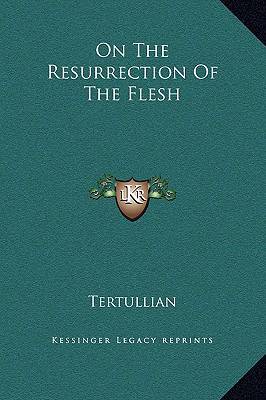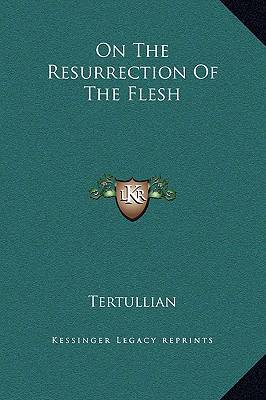
- Retrait gratuit dans votre magasin Club
- 7.000.000 titres dans notre catalogue
- Payer en toute sécurité
- Toujours un magasin près de chez vous
- Retrait gratuit dans votre magasin Club
- 7.000.0000 titres dans notre catalogue
- Payer en toute sécurité
- Toujours un magasin près de chez vous
Description
On The Resurrection Of The Flesh is a theological treatise written by Tertullian, a prominent Christian theologian and apologist who lived in the second century AD. The book is a defense of the doctrine of bodily resurrection, which was a central tenet of early Christian belief. Tertullian argues that the resurrection of the body is not only possible but necessary for the full realization of God's plan for humanity.The book is divided into three parts. The first part examines the nature of the resurrection body and its relationship to the soul. Tertullian argues that the body is an integral part of the human person and that it will be restored to its original state at the resurrection. He also addresses various objections to the idea of bodily resurrection, including the question of what happens to those who have been cremated or eaten by animals.The second part of the book focuses on the biblical evidence for the resurrection of the body. Tertullian cites numerous passages from the Old and New Testaments to support his argument, including the resurrection of Jesus Christ. He also discusses the implications of the resurrection for the afterlife and the final judgment.The final part of the book deals with practical issues related to the resurrection of the body, such as the timing of the resurrection and the fate of those who have died before the resurrection. Tertullian also addresses the question of whether the resurrected body will be subject to the same physical laws as the current body.Overall, On The Resurrection Of The Flesh is a deeply theological and philosophical work that explores the meaning and implications of the doctrine of bodily resurrection. It is an important text for understanding early Christian beliefs about the afterlife and the nature of the human person.Hence it is that heretics start at once from this point, (1) from which they sketch the first draft of their dogmas, and afterwards add the details, being well aware how easily men's minds are caught by its influence, (and actuated) by that community of human sentiment which is so favourable to their designs. Is there anything else that you can hear of from the heretic, as also from the heathen, earlier in time or greater in extent?This scarce antiquarian book is a facsimile reprint of the old original and may contain some imperfections such as library marks and notations. Because we believe this work is culturally important, we have made it available as part of our commitment for protecting, preserving, and promoting the world's literature in affordable, high quality, modern editions, that are true to their original work
Spécifications
Parties prenantes
- Auteur(s) :
- Editeur:
Contenu
- Nombre de pages :
- 114
- Langue:
- Anglais
Caractéristiques
- EAN:
- 9781169246652
- Date de parution :
- 10-09-10
- Format:
- Livre relié
- Format numérique:
- Genaaid
- Dimensions :
- 178 mm x 254 mm
- Poids :
- 417 g

Les avis
Nous publions uniquement les avis qui respectent les conditions requises. Consultez nos conditions pour les avis.






